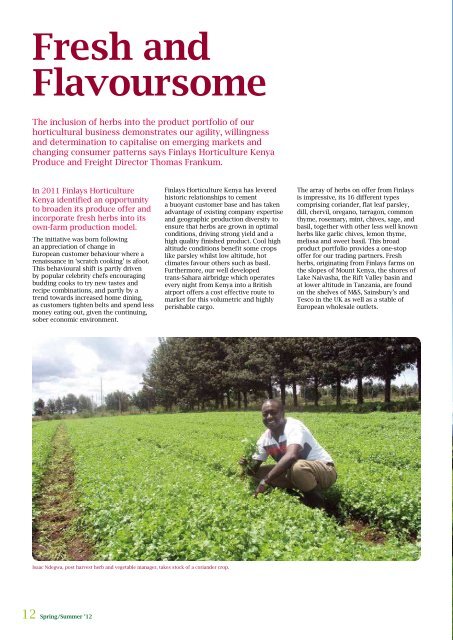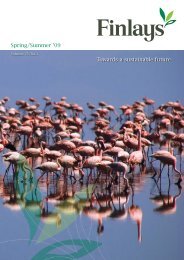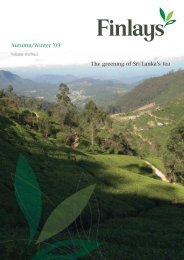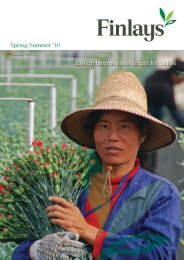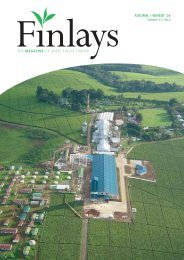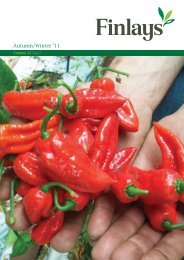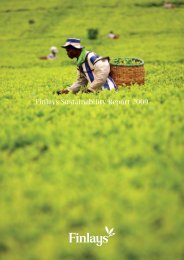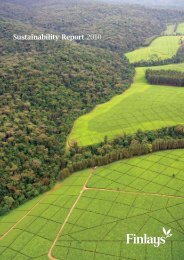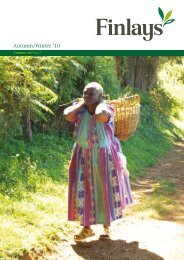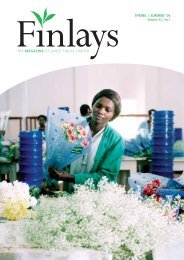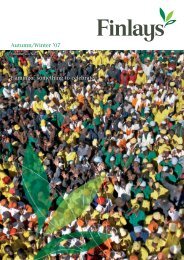You also want an ePaper? Increase the reach of your titles
YUMPU automatically turns print PDFs into web optimized ePapers that Google loves.
Fresh and<br />
Flavoursome<br />
The inclusion of herbs into the product portfolio of our<br />
horticultural business demonstrates our agility, willingness<br />
and determination to capitalise on emerging markets and<br />
changing consumer patterns says <strong>Finlays</strong> Horticulture Kenya<br />
Produce and Freight Director Thomas Frankum.<br />
In 2011 <strong>Finlays</strong> Horticulture<br />
Kenya identified an opportunity<br />
to broaden its produce offer and<br />
incorporate fresh herbs into its<br />
own-farm production model.<br />
The initiative was born following<br />
an appreciation of change in<br />
European customer behaviour where a<br />
renaissance in ‘scratch cooking’ is afoot.<br />
This behavioural shift is partly driven<br />
by popular celebrity chefs encouraging<br />
budding cooks to try new tastes and<br />
recipe combinations, and partly by a<br />
trend towards increased home dining,<br />
as customers tighten belts and spend less<br />
money eating out, given the continuing,<br />
sober economic environment.<br />
12 <strong>Spring</strong>/<strong>Summer</strong> ’12<br />
<strong>Finlays</strong> Horticulture Kenya has levered<br />
historic relationships to cement<br />
a buoyant customer base and has taken<br />
advantage of existing company expertise<br />
and geographic production diversity to<br />
ensure that herbs are grown in optimal<br />
conditions, driving strong yield and a<br />
high quality finished product. Cool high<br />
altitude conditions benefit some crops<br />
like parsley whilst low altitude, hot<br />
climates favour others such as basil.<br />
Furthermore, our well developed<br />
trans-Sahara airbridge which operates<br />
every night from Kenya into a British<br />
airport offers a cost effective route to<br />
market for this volumetric and highly<br />
perishable cargo.<br />
Isaac Ndegwa, post harvest herb and vegetable manager, takes stock of a coriander crop.<br />
The array of herbs on offer from <strong>Finlays</strong><br />
is impressive, its 16 different types<br />
comprising coriander, flat leaf parsley,<br />
dill, chervil, oregano, tarragon, common<br />
thyme, rosemary, mint, chives, sage, and<br />
basil, together with other less well known<br />
herbs like garlic chives, lemon thyme,<br />
melissa and sweet basil. This broad<br />
product portfolio provides a one-stop<br />
offer for our trading partners. Fresh<br />
herbs, originating from <strong>Finlays</strong> farms on<br />
the slopes of Mount Kenya, the shores of<br />
Lake Naivasha, the Rift Valley basin and<br />
at lower altitude in Tanzania, are found<br />
on the shelves of M&S, Sainsbury’s and<br />
Tesco in the UK as well as a stable of<br />
European wholesale outlets.<br />
Fresh and Flavoursome<br />
Thomas Frankum<br />
Back on the farm, the inclusion of herbs<br />
greatly assists crop rotation and soil<br />
health, both cornerstones of horticultural<br />
sustainability. It’s really just good old<br />
fashioned farming practice, the<br />
importance of which was first established<br />
and refined in the last millennium during<br />
Britain’s Agricultural Revolution. Rotating<br />
crops and applying sound husbandry<br />
techniques protects the soil and ensures<br />
that we will be able to farm the same<br />
ground for decades to come. Freshness is<br />
guaranteed by the use of bespoke field<br />
harvest and processing machinery which<br />
is in action soon after sunrise, in the cool<br />
of the day, enabling product to hit<br />
continuous cold chain quickly after crops<br />
are cut. A ‘cold chain’, which involves<br />
getting the product cold quickly and<br />
keeping it chilled at between 2 and 4<br />
degrees centigrade until it reaches the<br />
eventual customer, is essential for<br />
product quality. Adherence to such<br />
rigorous post harvest discipline is policed<br />
using complex time and temperature<br />
measures, referred to as degree-hours.<br />
Isaac Ndegwa (pictured left) masterminds<br />
the grass roots herb operation, setting up<br />
planting plans, orchestrating harvest and<br />
managing cold chain and logistics. So,<br />
next time you enjoy a Pimm’s cocktail<br />
with mint, lamb with rosemary, chicken<br />
with tarragon, salmon with dill, a fresh<br />
basil and tomato salad or a green curry<br />
with coriander, your taste buds may have<br />
Isaac to thank!<br />
In 2011 we established a reputation with<br />
herb-buying customers for great quality<br />
and this is now manifesting itself into a<br />
strong order book. Our planting<br />
programme for the <strong>2012</strong>/13 season looks<br />
promising, one step closer to making<br />
<strong>Finlays</strong> the biggest fresh herb grower/<br />
exporter in Africa.<br />
<strong>Vol</strong>ume <strong>48</strong>/<strong>No.1</strong> 13


